NATIONAL SERVICE TRAINING PROGRAM 1 STUDENT NAME: JEZEL IVIE C. ALCANTARA COURSE: B.S. BUSINESS ADMINISTRATION (ETEEAP) DATE: February 24, 2025

The Philippines National Service Training Program (NSTP) has drawn a direct relation between self-control, participation and compassion towards one’s community. According to the NSTP, self-awareness is fundamental in achieving not only personal goals but also in becoming a good citizen. However, most people disregard this idea thinking action alone will be enough. Social participation without understanding oneself and one's environment, lacks effectiveness. For this reason, attempts should be made to increase self-awareness in any person who seeks to help effectively. The program got to my bad nerds I feel is, "what can I do better?", playing an active role at the boundary of the zone of comfort, guided by fear I hack barriers. KEY LESSONS: 1. Self-Discovery and Development—Recognizing your strengths and weaknesses. 2. Personal responsibility is to take accountability for our actions. 3. Social Awareness and Citizenship involve challenges faced by our community and society. The key is to identify the necessary changes and be willing to participate in them. 4. Life is really about what we believe and think. Our actions are a direct result of our principles. Even the most minor decisions count. It is kind of like every decision is a stepping stone. To chart your course, you need to establish who you are. Reflect upon your ideas about the world. In your opinion, what stands in a privileged position? Once we know this, we stop repining, but we strive instead to change our life. CASE STUDY BEST PRACTICES: 1. The program aims at increasing the access to education in the rural areas. This initiative asked the students to volunteer for being tutors to children in poor communities. This has made me comprehend the role of education as a means of power. Balmeo et al. (2015) stated that the NSTP participation aided the students in identifying and responding to the educational needs of their respective communities. I gained more insight into the difficulties that these children go through and how education can be a way out. 2. Disaster risk reduction and management program in cities. This program taught NSTP students how to handle emergencies effectively. Sagun-ngtangco and others (2016) talked about how important it is for NSTP leaders to focus on managing risks and disabilities
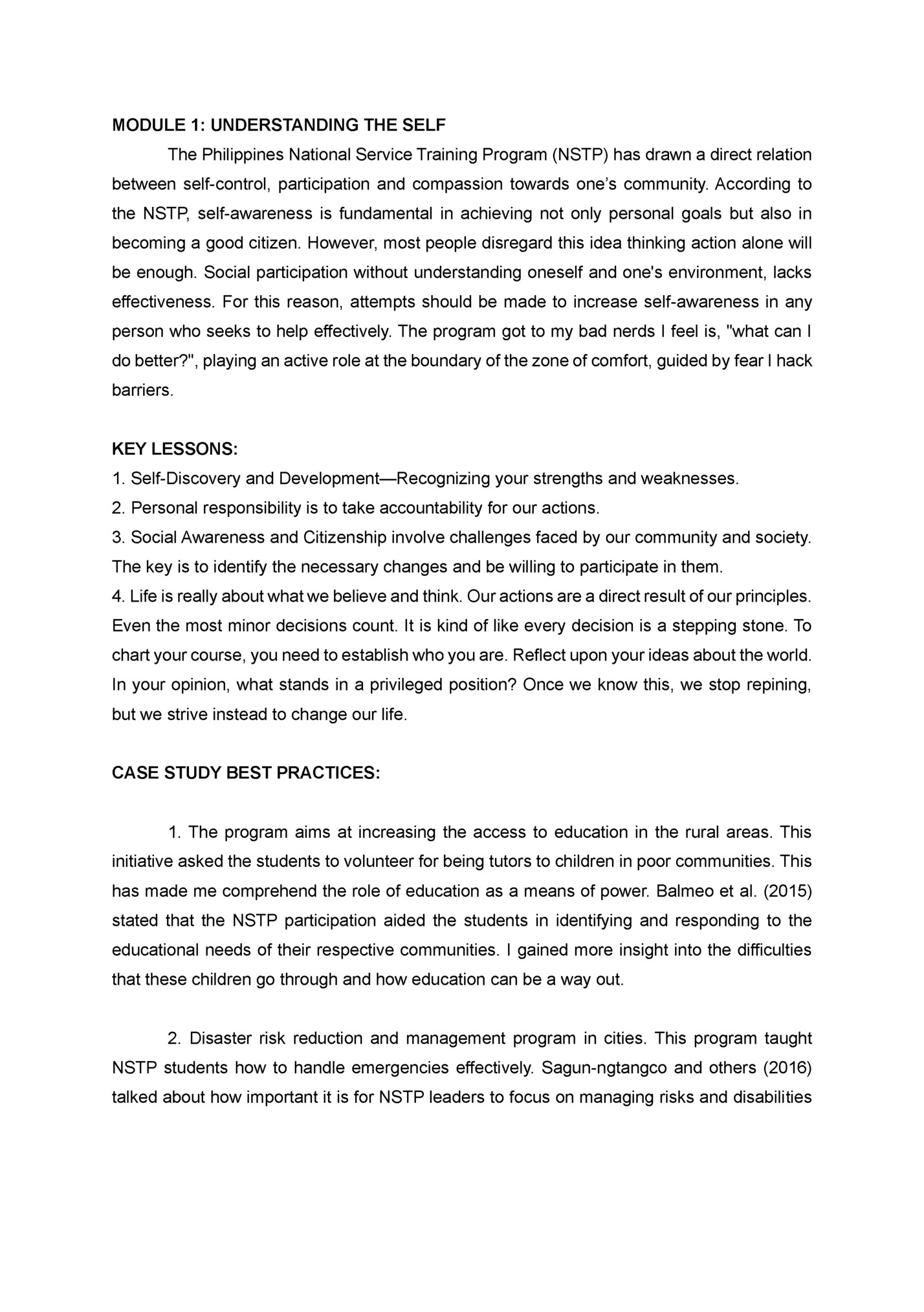
skills but also encourages them to care for those in need. CRITICAL REFLECTION: These considerably influenced the way I see my role in solving social problems. I realize that to really make a change, I must continue to plead in favor of education and preparation for disasters in my community. The lessons learned from the NSTP motivate me to take measures, whether by volunteering, raising awareness or promoting educational programs. It is clear to me now that being part of a community means contributing to its improvement. What I learned was that understanding yourself is not just a personal endeavor but a shared obligation. I realized that I can no longer be inactive. I have a role to play in addressing the challenges faced by part of the world in which I live. I want to make the most out of all the lessons I learned and apply them. In conclusion, I am determined to use my voice and the skills I have acquired to defend those who need it. Understanding what others have gone through will help me address community problems better and make sure my actions improve people's lives. Thanks to education and preparation, I believe that I can play a vital role in the construction of a more resilient and autonomous society and my personal commitment to the service. REFERENCES: Manuel, C. M. M., Alumno, M. C., & Alcantara, M. K. Community Immersion: It’s Effect on the Lifelong Learning Skills of NSTP Students. Agas, J. M. Q., de Leon, M. K. C. C., & Ricafrente, M. C. PROGRAM MODULE. Balmeo, M. L., Falinchao, J. P., Biay, K. K. L., Ebes, J. K. M., Eclarino, J. G., & Laoang, I. G. P. (2015). The Effects of NSTP on the Lives of Saint Louis University Students. IAFOR Journal of Education, 3(1), 77-91. Sagun-Ongtangco, K. S., Abenir, M. A. D., Bermejo, C. T., Shih, E. D. C., Wales, J. V. O., & Plaza, J. (2016). Perspectives of the UST NSTP facilitators on disability and disaster risk reduction and management: A qualitative case study. International Journal of Disaster Risk Reduction, 16, 134-141.
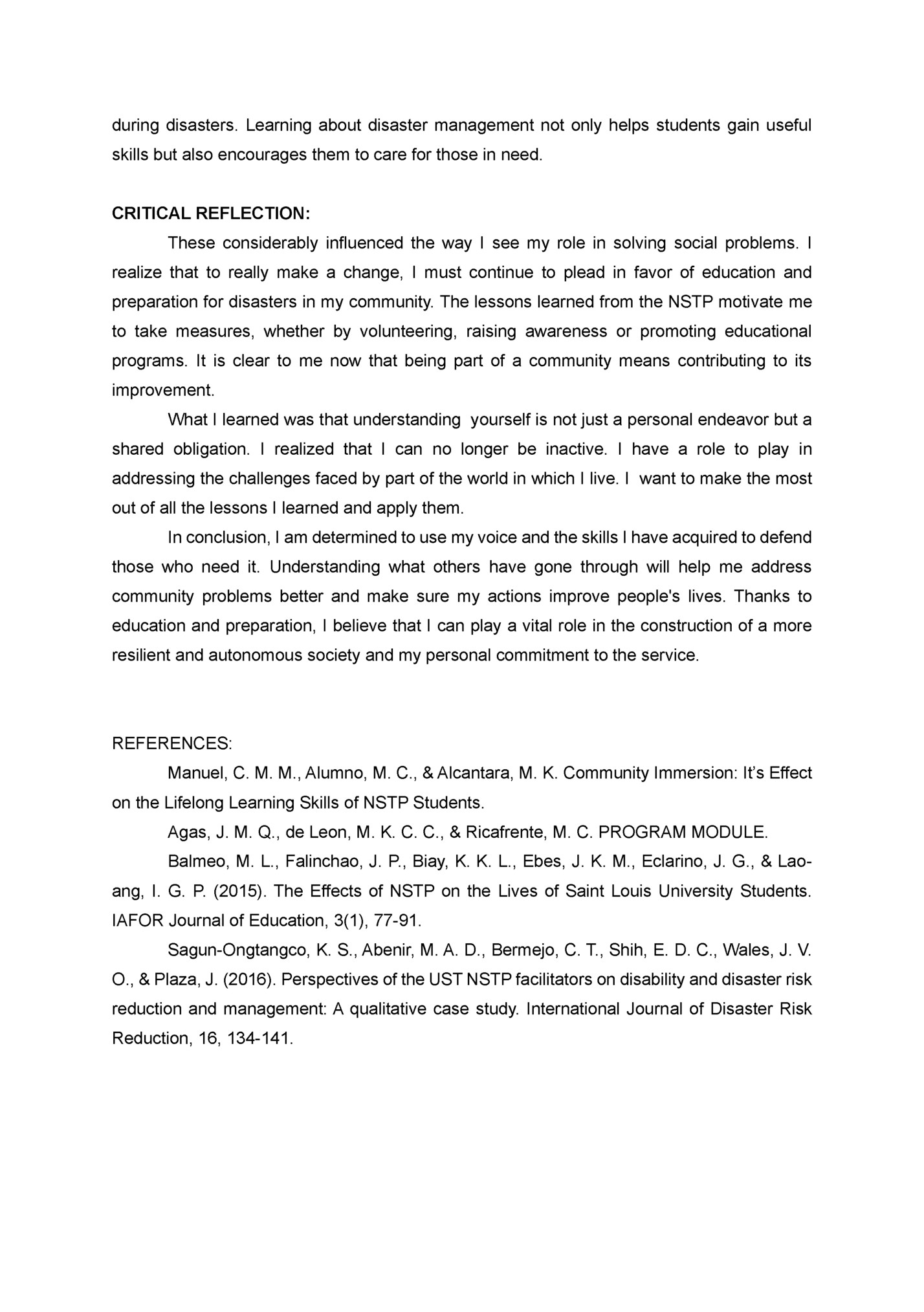
Nationalism, citizenship and the construction of the nation are essential concepts that we must better understand, in particular in the context of the National Training Program (NSTP) in the Philippines. The National Training Program (NSTP) in the Philippines motivates us to participate in activities that promote civic responsibility, community service, and global national development. During my learning experience, I learned important lessons that show how valuable these ideas are. The NSTP taught us that nationalism is more than just pride in your country; it's active participation in your benefit. Nationalism encourages us to think beyond ourselves and to consider what we can do for our communities. Custodio et al. (2016) found that NSTP improves volunteering, which plays a crucial role in building the nation. By getting students involved in projects that help the community, we learn that each small service act contributes to the overview of national progress. Nationalism and citizenship closely shape our identity as individuals belonging to a nation. In NSTP, we learn that being a citizen not only means enjoying rights but also fulfilling duties. Garıngan (2021) stresses that the implementation of the NSTP helps students appreciate the balance between these aspects. KEY LESSONS: 1. Active citizenship is an important factor in the strengthening of democratic societies and governance and refers to an individual participating in activities of interest. Finally, active citizenship may also refer to casting a vote since every vote counts. The notion of active citizenship also relates to real issues one has in their city or country. There are numerous local associations and clubs for people who want to engage. There are multiple local associations and clubs for people who wish to engage. For instance, you can take part in a neighborhood retreat, a charity auction, or a community activity, such as gardening. Belonging to a given group connects one in a way. Hence, an active citizen is someone who will readily address your issues. An active citizen also tends to enquire about problems which he believes could be better or different. Being an active citizen is not a privilege for politicians. It is in the power of everyone. The best way to invest voice and time starts by being involved in the change.
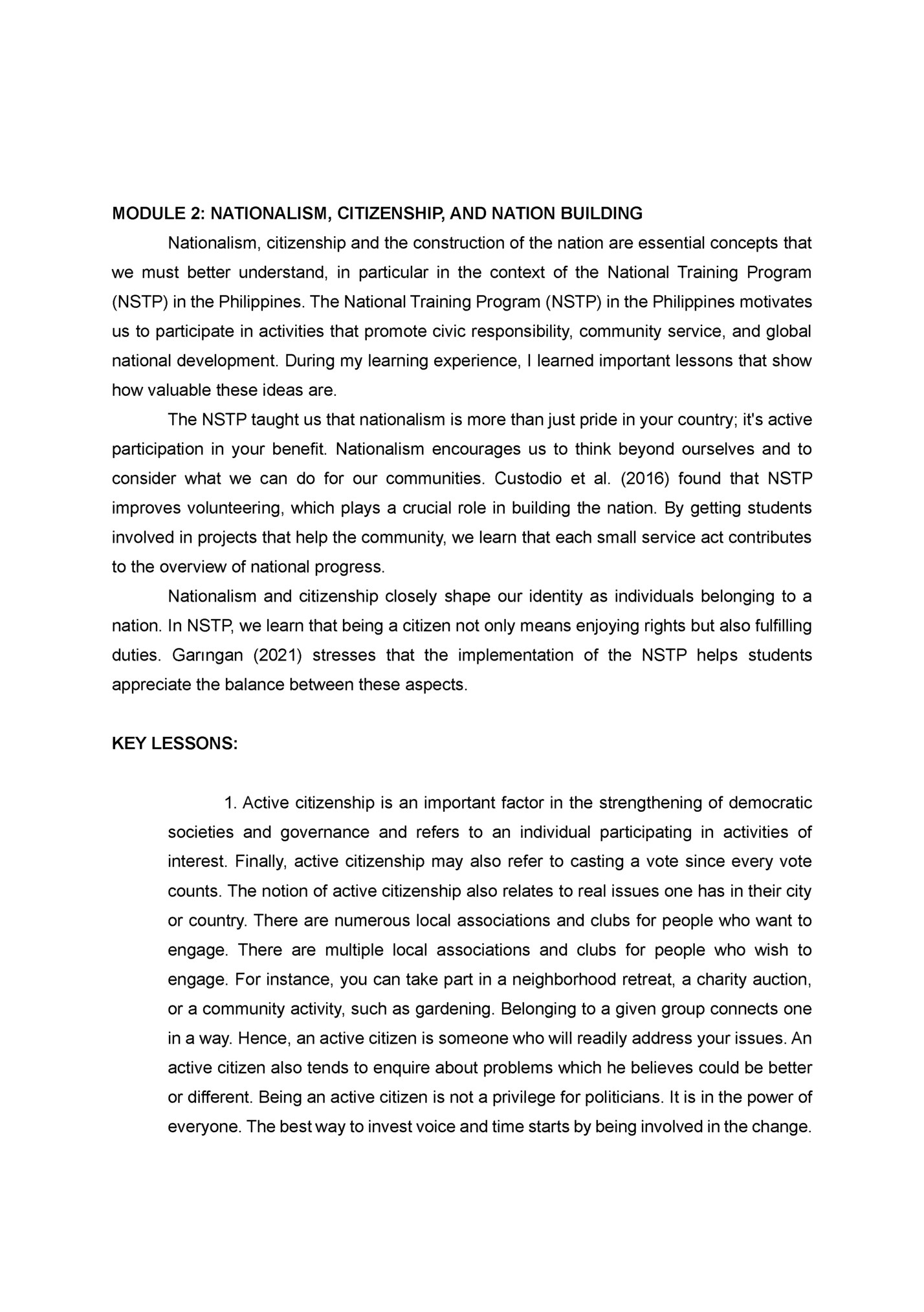
take pride in their country, they are more likely to participate in its development. Observe volunteering. Many people participate in community projects or assist in their areas just because they have a deep concern for their hometown. They wish to contribute in some manner. 3. Building a strong country is about collaboration and inclusiveness. Working together and including others helps people pool their ideas to solve problems effectively. Inclusivity means that every person's opinion counts; there is no dependence on who a person is. This makes people feel a sense of belonging. When people feel part of something bigger, they tend to care more about their community. CASE STUDY BEST PRACTICES: 1. Reconstruction efforts after the Haiyan typhoon in 2013. This natural disaster tested the spirit of volunteering in the Philippines. Many students who had crossed the NSTP are mobilizing to help the affected communities. Their actions not only provided immediate assistance but also favored a feeling of unity and nationalism among volunteers because they worked tirelessly to help the other Philippines (Zamora, s.d.). This situation has demonstrated how national emergencies can motivate unified action rooted in a deep sense of belonging to a community. 2. Educational initiatives surrounding K–12 aim to improve the quality of education in the country. MACA and Morris (2014) explain how education plays an important role in training national identity. I saw projects linked to the K-12 program, such as tutoring disadvantaged children. Being involved helps us understand our duty as citizens to help our society, especially by guiding the young people who will lead our country in the future. CRITICAL REFLECTION: I want to be in charge of initiatives that promote volunteering in my community, strengthening the lessons I I am going to mobilize the team for cleaning the have learned. For instance, environment and educational seminars targeting the youth. As I carry out these tasks, I believe that I can inspire others to recognize themselves as citizens with the potential to positively impact our nation.
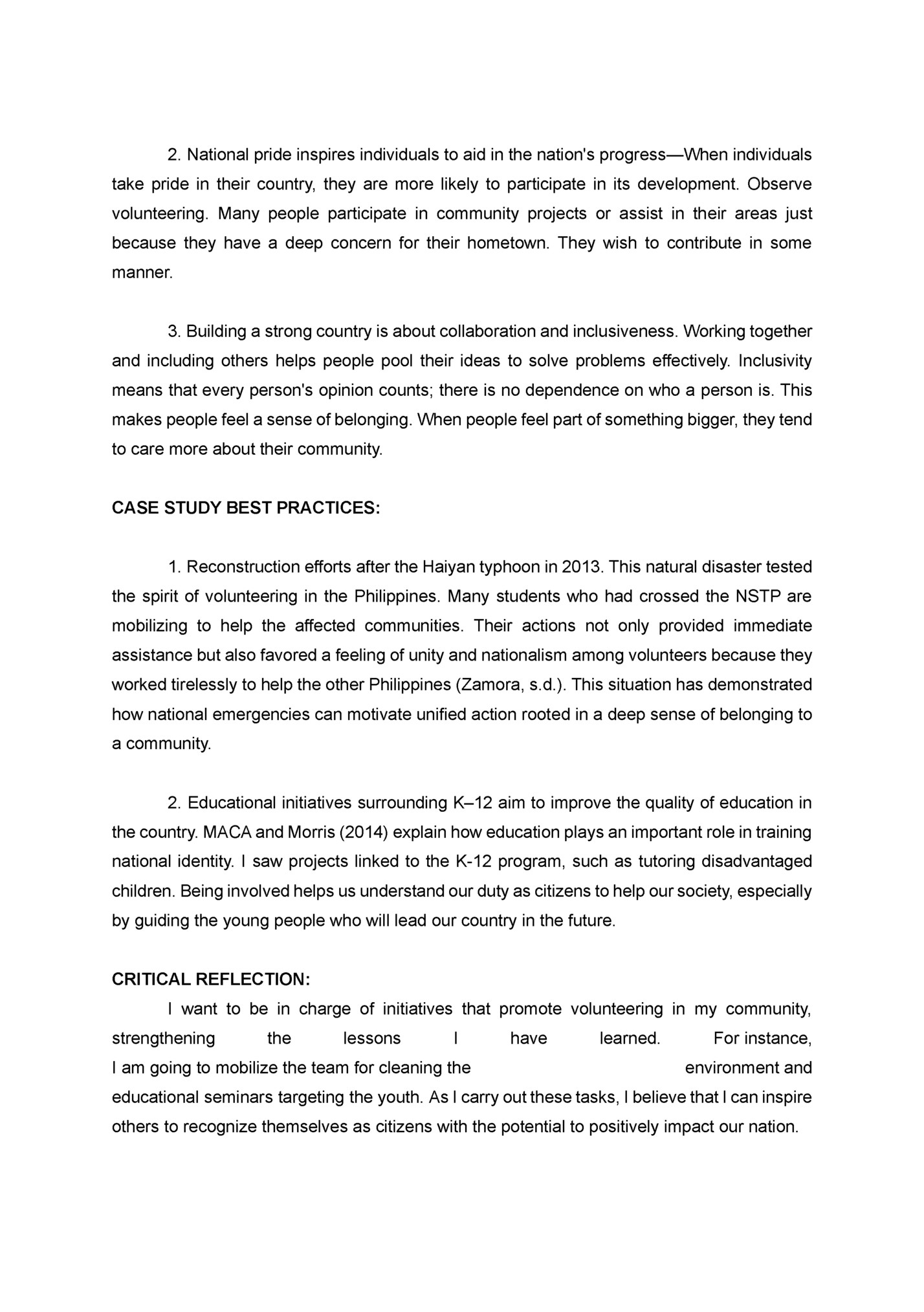
of my country. I will represent what it means to be a citizen through my active engagement with my local community. These experiences shall be my trump card when the time comes for me to take the right steps in embarking on the present journey toward nation-building in the Philippines. REFERENCES: Custodio, Z. U., Rungduin, T., Fernandez, E. V. M., Ortega, R. R., Urbiztondo, L. A., & Sabate, R. D. (2016). Impact evaluation of the NSTP in promoting volunteerism towards nation-building. AsTEN Journal of Teacher Education, 1(2). Garıngan, E. (2021). The implementation of national service training program. International Journal of Educational Research Review, 6(3), 194-207. Maca, M., & Morris, P. (2014). Education, national identity and state formation in the modern Philippines. In Constructing modern Asian citizenship (pp. 125-148). Routledge. Zamora, E. V. (2024). IMPLEMENTATION OF THE NATIONAL SERVICE TRAINING PROGRAM (NSTP) IN SELECTED TERTIARY INSTITUTIONS OF THE NATIONAL CAPITAL REGION: INPUT TO A PROPOSED TRAINING MODEL. Ignatian International Journal for Multidisciplinary Research, 2(5), 1612–1631. https://doi.org/10.5281/zenodo.11213778
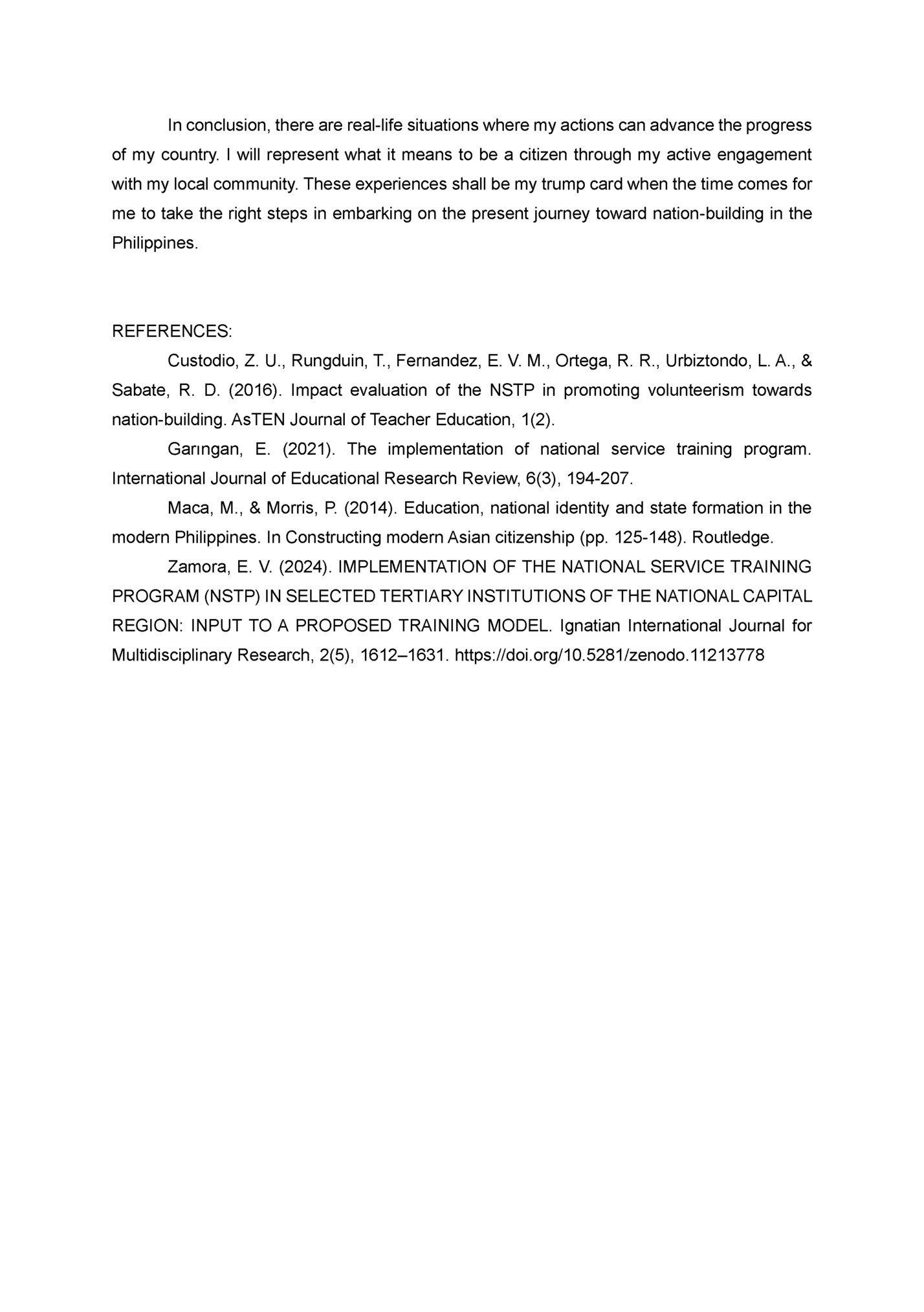
Volunteering plays a vital role in the National Services Training Program (NSTP) in the Philippines. This initiative seeks to build civic consciousness and readiness for defense in youth. By parti cipating in different community service projects, we appreciate the importance of contributing and the positive effect it can create in our community. The importance of volunteering goes beyond only helping others; it encourages a sense of collaboration and unity among individuals. The value of working together as a team is one of the most important things that I have realized. For example, in a community cleaning campaign, we discovered that everyone had their strengths. Some volunteers are strong in the areas of organization and event planning, while others are known for their leadership and motivation skills. Based on the findings of Custodio et al. Effective initiatives are driven by teamwork, this also results in a good and supportive environment in which everyone feels appreciated. Community needs should be a priority. Participating in different dissemination programs will make you aware of several social problems that many Filipinos face. A standout case study is from a local school where we carry out tutorial sessions for disadvantaged children. This revealed how education can change lives and highlighted the gap between different social classes. AGAS, as noted by Leon and Ricafent (N.D.), highlights that engagement in community servi ce enables volunteers to gain a deeper insight into these issues, fostering greater empathy towards others. CASE STUDY BEST PRACTICES: 1. Garbage collection initiative in a coastal area. The volunteers worked to clean the beaches and raise awareness about the protection of the environment. The project not only improved the local environment but also educated the community about the maintenance of cleaning and the importance of marine life. Quendangan and Laquesta (2014) pointed out that community service projects such as these promote environmental administration among volunteers. It is encouraging to see how these activities inspire local leaders to advocate sustainable practices 2. We launched health awareness campaigns in several communities. Our group organized health seminars aimed at educating the locals about hygiene, nutrition and preventive medical care. Reaching families who had limited access to health information was
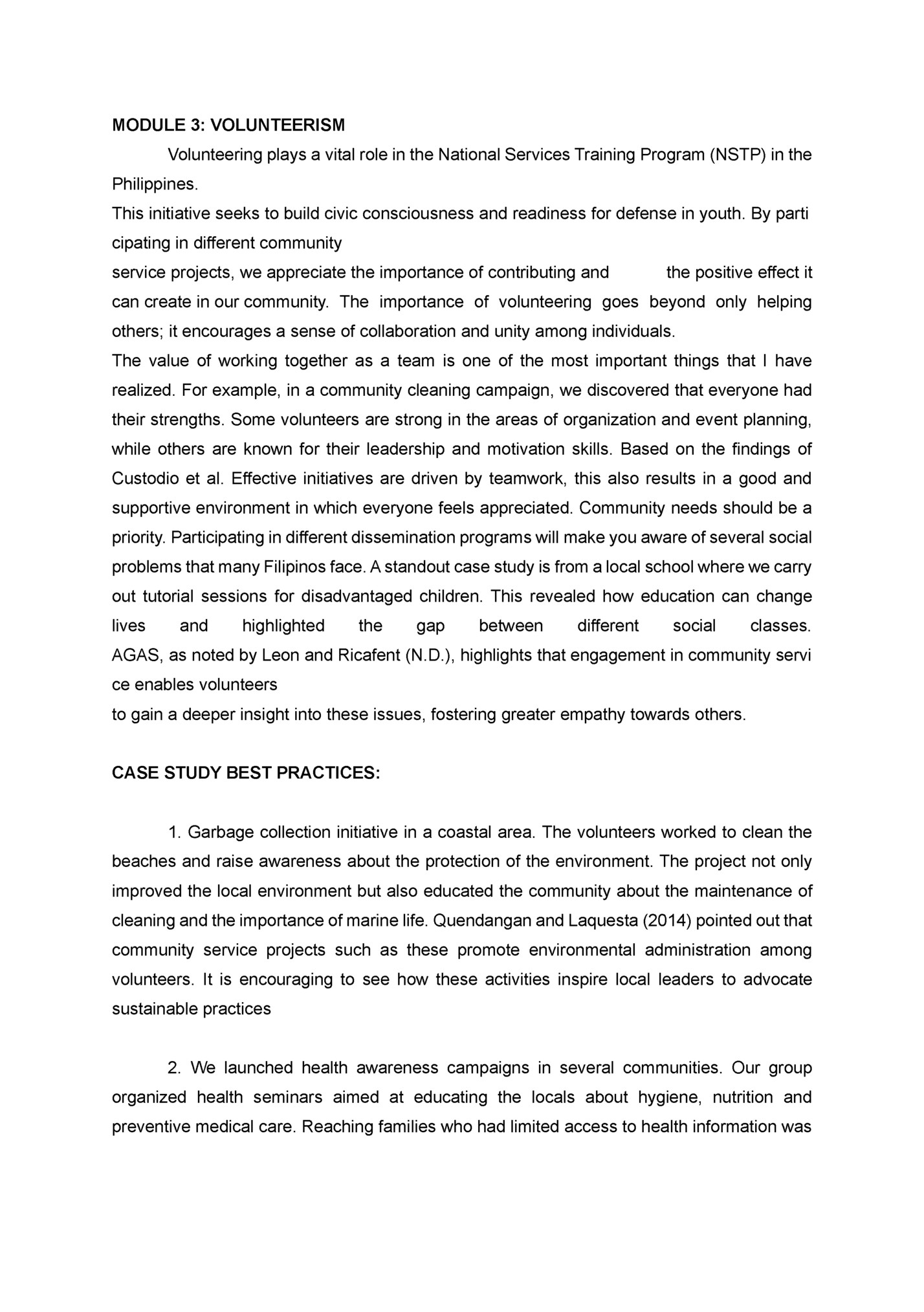
(2019) discussed the positive social impacts of these service-learning components, showing how they contribute to the general welfare of the community. Witnesses of families implementing healthier practices reflected the direct influence that we can have through our volunteer efforts. CRITICAL REFLECTION: Volunteering will enhance my leadership abilities while also increasing my awareness of the issues facing our nation. There is also the potential to cultivate mutual respect and build r elationships with the communities we support. It also taught me that volunteering is a powerful agent for change. The direct connections made with the members of the community will change your perspective on social responsibility. Now I realize that every small act of service can bring about big change. I am looking forward, and I hope in the forthcoming projects, my actions will really inspire many youth to be involved in volunteering activities actively. Volunteering has shown me that helping someone is not actually shaping the ones that we are serving—it shapes us. It is about being sensitized to the environment, sensitizing our role of creating change. Lessons learned from volunteering in NSTP may guide our actions and ambitions in the coming years. REFERENCES: Custodio, Z. U., Rungduin, T., Fernandez, E. V. M., Ortega, R. R., Urbiztondo, L. A., & Sabate, R. D. (2016). Impact evaluation of the NSTP in promoting volunteerism towards nation-building. AsTEN Journal of Teacher Education, 1(2). Agas, J. M. Q., de Leon, M. K. C. C., & Ricafrente, M. C. PROGRAM MODULE. Quendangan, M. M., & Laquesta, J. S. (2014). National Service Training Program Community Services. Researchers World, 5(3), 98. Abenir, M. A. D. (2019). The social impact of the service-learning components of the National Service Training Program in the Philippines-The case of the University of Santo Tomas. 7th Asia-Pacific Regional Conference on Service. Learning, 1-6.
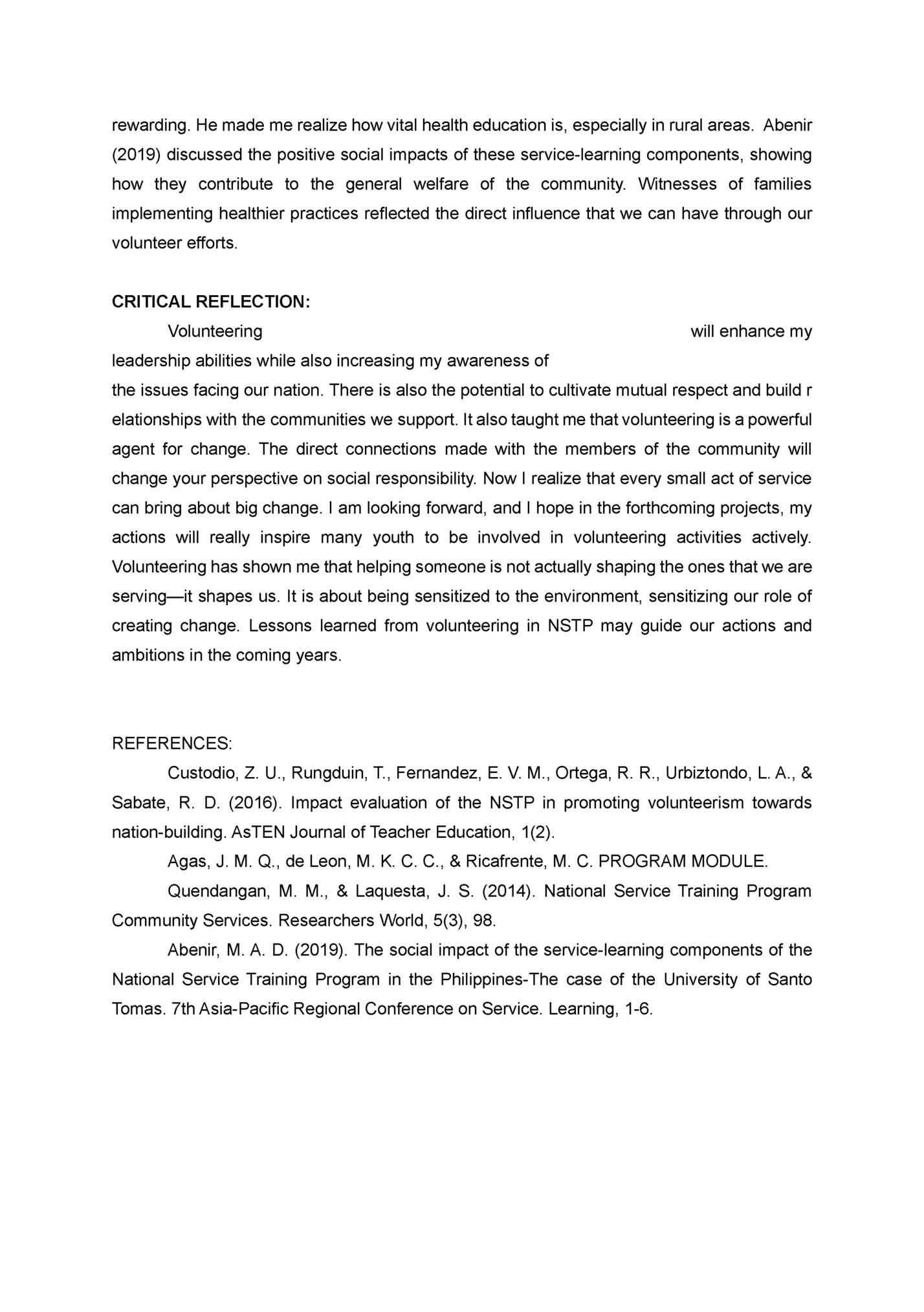
The module on Philippine society and culture emphasizes the rich diversity, historical depth, and shared values of the Filipino people. The Philippines is an important initiative that aims to instill civic consciousness and encourage young people to serve the community. We learn about the problems our society faces and the traditional beliefs that bring the people of the Philippines together. KEY LESSONS: 1. It is important to understand the bayanihan core values: community spirit, pakikipagkapwa—social harmony, and Ramayan—empathy, and the role of religion in shaping Filipino identity. 2. Examining social issues like poverty, inequality, and environmental decline, along with their effects on communities. 3. The program is aimed on promoting civic duty and active involvement in community progress, in line with NSTP's objective of cultivating socially conscious and responsible individuals. CASE STUDY BEST PRACTICES: 1. Our community is struggling with waste management. We organize a cleaning team in a nearby barangay to tackle this problem. The initiative improved community cleanliness and provided residents with waste disposal education. The importance of teaching sustainable development in universities is emphasized by Balaanay and Halog, who believe it is essential for fostering awareness. Our impulse caused conversations within the community and encouraged long-term changes in waste management habits. 2. Neglected areas: This involves health disparities. We organize free medical checkups and distribute health organizations. education amongst them with collaborating local healthcare This has helped address such critical health concerns while also enhancing the residents' awareness of preventive health care.
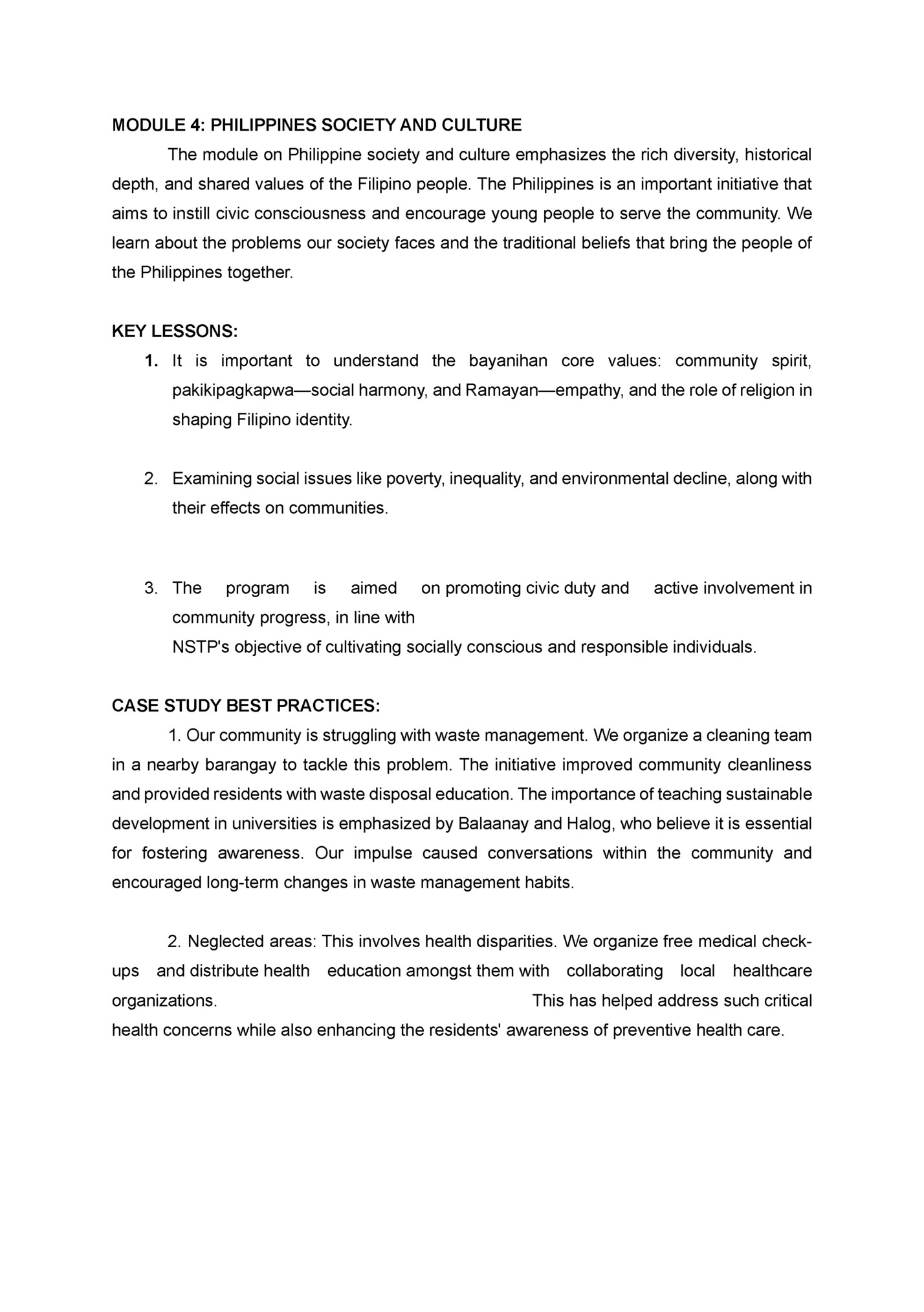
Fleepit Digital © 2021